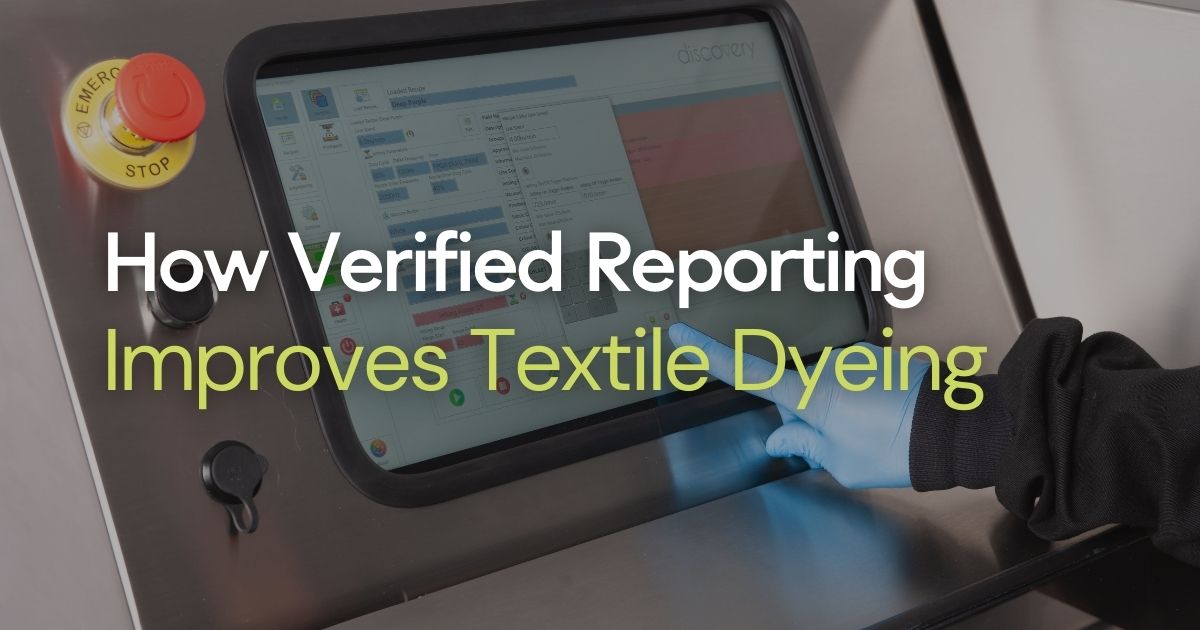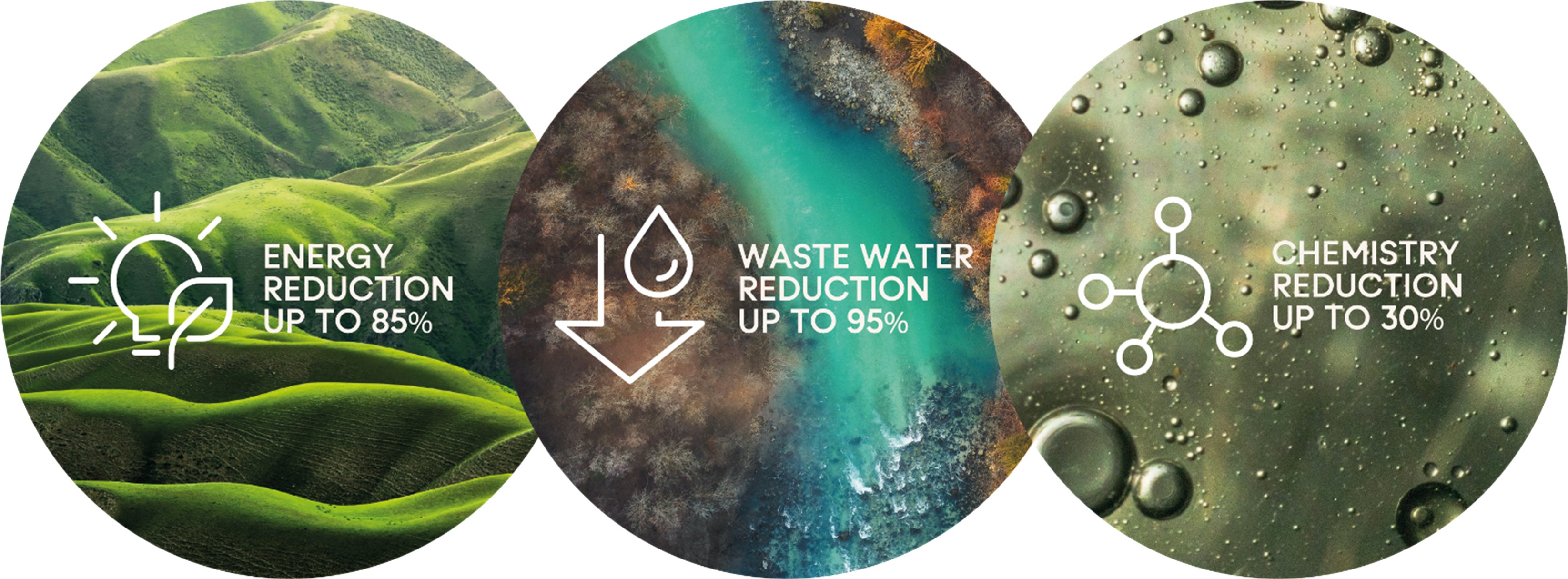 In an increasingly sustainability-conscious world, environmental claims alone are not enough. Instead of vague, “sustainable” statements, that risk being nothing more than “greenwashing”, there are calls for greater transparency within the textile industry. International frameworks such as the EU Green Deal, Digital Product Passports (DPPs), and the UN Sustainable Development Goals (UNSDGs) are all influencing brands and dyehouses to have auditable, data-driven insights into their dyeing processes. This data will inform any reporting during textile dyeing, while justifying any sustainability claims.
In an increasingly sustainability-conscious world, environmental claims alone are not enough. Instead of vague, “sustainable” statements, that risk being nothing more than “greenwashing”, there are calls for greater transparency within the textile industry. International frameworks such as the EU Green Deal, Digital Product Passports (DPPs), and the UN Sustainable Development Goals (UNSDGs) are all influencing brands and dyehouses to have auditable, data-driven insights into their dyeing processes. This data will inform any reporting during textile dyeing, while justifying any sustainability claims.
What is Verified Reporting?
Verified reporting is the process of gathering, validating, and transparently communicating data. For textile dyeing, this means ensuring every step, from fibre to finish, is documented, verified, and disclosed. Examples include Fibre Quality Testing (for composition and grade of materials used), adherence to International Standards (like ISO 3801 for fabric mass), and Performance Testing such as colour fastness, colour matching, colour uniformity, and hand feel.
Why is Verified Reporting Needed?
The textile industry faces growing scrutiny from regulators, investors, and consumers alike. Particularly since the rise of greenwashing, eroding trust and causing stakeholders to now expect hard evidence. Verified reporting can turn sustainability from a marketing story into an accountable practice, enabling brands and dyehouses to:
- Meet regulatory compliance standards
- Demonstrate transparency to customers and partners
- Build competitive advantages through credibility
Therefore, the need for verified reporting is no longer optional. It is the foundation for trust in a sustainable textile value chain.

Canva (2025).
The Problem with Traditional Textile Dyeing
Traditional textile dyeing methods are resource-heavy, extremely polluting, and poorly reported. For textile production and dyeing alone, over 70% of emissions originate from upstream supply chain activities (Global Fashion Agenda, 2018). Yet the reporting of these impacts, such as water use, energy consumption, and chemical waste, has historically been weak, inconsistent, and hidden from public view. This lack of transparent data makes it nearly impossible for stakeholders to trust sustainability claims.
Poor reporting practices in traditional dyeing are one of the biggest barriers to achieving real sustainability in the industry. Modern consumers are no longer tolerating vague or generic “eco-friendly” labels; they want verified evidence. Regulators are also raising the bar, demanding transparent, traceable reporting across supply chains. Faced with this pressure, brands and dyehouses are recognising that without better data and verifiable reporting, sustainability goals cannot be achieved. Driving the search for scalable, cleaner dyeing technologies.
Verified Reporting Improving Textile Dyeing
Verification from third-party organisations will strengthen the authenticity of sustainable results reported by brands and dyehouses. Independent validation ensures that reductions in water, energy, and chemical use are genuine, not just claims. This accountability builds trust with consumers, investors, and regulators, positioning verified reporting as a key factor in achieving sustainable textile dyeing.
Currently, clean-tech innovations have many forms. From recycled and biodegradable dyes to waterless textile dyeing. Wherever you look, actions are being taken to address the dyeing industry’s environmental impact.
In terms of clean-tech innovation at production-scale, digital textile dyeing is proving a sustainable alternative to traditional textile dyeing. Unlike traditional methods that flood fabric with excess water and dyes, digital dyeing applies colour precisely. Demonstrating that digital textile dyeing is a way of modernising an age-old process fit for the future.
Linking Sustainability and Proof
Imagine factories where every drop of dye, every watt of energy, and every litre of water is tracked, optimised, and reported in real time. Verified reporting built on digital processes can provide the traceability and trust needed to make this a reality.
At Alchemie Technology, our clean-tech production solutions are not just better for the environment, they create data needed for verified reporting. From water savings to chemical reductions to process efficiencies. All these datasets can be integrated directly into sustainability metrics. Improving efficiency and flexibility in production runs, while also creating the link between sustainability and proof, from the factory floor to the reporting frameworks that stakeholders demand.
Using our lab-scale Discovery and production-scale Endeavour™ systems, brands and dyehouses have access to measurable, reportable data to use in respective frameworks. Brands and dyehouses can improve their textile waste management and reusability through Discovery. Using our reverse osmosis process to reuse dye, compared to discharging it as waste post-dyeing. As for Endeavour™, brands and dyehouses can support local production through reshoring as a complete dyeing solution that dyes, fixes, softens, and dries fabrics. While both systems support dye recipe libraries, enabling you to record and store exact formulations for optimal dyeing efficiency.

Alchemie Technology for Low-Carbon Digital Textile Dyeing
Combining digital dyeing and verified reporting will prove a powerful asset to brands and their dyehouse partners. With clean-tech innovations to hand, brands and dyehouses will experience efficiency gains, while translating reporting frameworks into trusted sustainability metrics.
Through Alchemie’s data-driven dyeing solutions, brands and dyehouses can track water, energy, and chemistry savings automatically. Using verified metrics to support them in their DPP or UNSDG reporting and third-party audits. Confidently demonstrating sustainability to industry stakeholders (i.e., investors, regulators, etc.). Ultimately, empowering consumers with knowledge to regain trust in brands.
This shift moves the industry from outdated methods to verified reporting and improves textile dyeing. Ensuring that sustainable textiles is both authentic and accountable. Weaving a future where fabric colouration and credibility go hand in hand.
Data-driven dyeing in your hands.
Contact us today: enquiries@alchemietechnology.com.